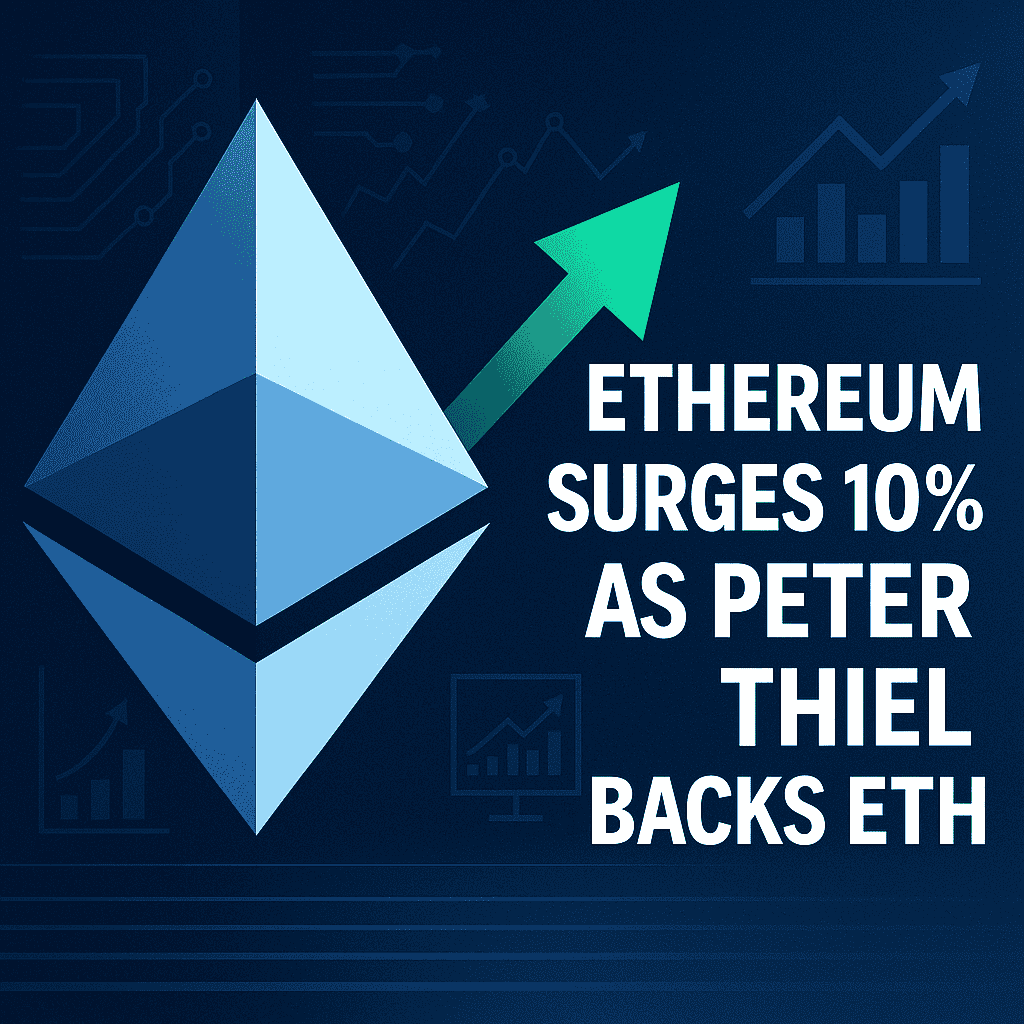Introduction
Ethereum (ETH) made a powerful move today, surging around 10% to trade near $4,750, fueled by growing institutional support—most notably from billionaire investor Peter Thiel. Thiel’s strategic backing of Ethereum-centric companies amplifies market sentiment, signaling a potential long-term shift in how digital assets are valued and deployed.
Market Movement: ETH’s Remarkable Rally
Ethereum’s notable 10% climb reflects broader optimism around the token. Over the course of the month, ETH has gained approximately 13.5%, contributing to a year-to-date surge of around 27%, notably outperforming Bitcoin.
This rally is not isolated—macro tailwinds like reduced rate hike expectations and renewed institutional interest are bolstering Ethereum’s appeal as a strategic treasury asset.
Peter Thiel’s Strategic Bet on Ethereum
ETHZilla: A Transformative Pivot
Peter Thiel’s Founders Fund recently acquired a 7.5% stake in ETHZilla, formerly known as 180 Life Sciences. The firm has rapidly transformed into a crypto treasury entity, now holding approximately 94,675 ETH (~$419 million) and rebranding around its new digital focus.
Confidence in Yield-Enabled Ethereum
Thiel’s commitment to ETHZilla emphasizes Ethereum’s dual value proposition: price appreciation and yield generation. Through staking and DeFi, ETH can produce active returns—a critical differentiator from Bitcoin’s traditional “hold only” narrative.
His involvement reignites a narrative of Ethereum as a productivity-generating asset rather than purely speculative, reshaping institutional capital’s relationship with crypto.
Ripple Effects: From Stocks to Blockchains
ETHZilla Share Volatility
Despite buoyant crypto markets, ETHZilla’s shares recently dipped nearly 30% due to dilution fears sparked by a large convertible share offering—highlighting the risks that accompany aggressive treasury strategies.
Corporate Treasury Shift Toward Crypto
ETHZilla isn’t alone. Corporate treasuries have collectively accumulated over 4.1 million ETH, valued around $17.6 billion, solidifying the trend beyond niche experimentation.
Why Institutions Are Turning to Ethereum
Programmable Utility
Ethereum supports decentralized finance, smart contracts, and NFTs—functionality that makes it a cornerstone for future financial systems. Its programmability sets it apart from traditional cryptocurrencies.
Yield Potential
Unlike many assets, ETH offers staking yields (3–5% APY) and variable income from DeFi protocols (up to 14% APY), adding an attractive layer of return for institutional balance sheets.
Institutional Legitimacy & Network Effects
Institutional buy-in—from funds like Founders Fund—and regulatory tailwinds give Ethereum enhanced credibility. Its adoption by venture capital and financial firms helps legitimize ETH as a viable asset class.
Key Risks to Consider
- Dilution & Equity Pressure: ETHZilla’s stock drop highlights how equity-related risks can undermine crypto enthusiasm.
- Crypto Volatility: Despite short-term gains, ETH remains highly volatile, especially where leverage and speculative flows are strong.
- Regulatory Shifts: Ethereum benefits from favorable classification so far, but policy changes could disrupt institutional momentum.
Outlook: Ethereum’s Institutional Inflection
| Domain | Insights |
|---|---|
| Investor Strategy | ETH could become a strategic reserve with income potential |
| Market Behavior | Institutions flocking may herald a new bull market |
| Crypto Ecosystem | Increased ETH demand may elevate staking platforms and DeFi participation |
| Long-Term Implications | ETH may emerge as a foundational financial infrastructure |
Conclusion
Ethereum’s 10% surge today, amplified by Peter Thiel’s institutional backing, marks a pivotal moment for crypto markets. No longer merely a speculative token, Ethereum is being seen as a valuable, yield-generating asset class—and institutions are taking notice.
Stakeholders—from institutional investors to DeFi strategists—will be watching closely: Is this the dawn of a new bull market driven by productivity and utility? Or will structural risks cast shadows on Ether’s growing prominence?

